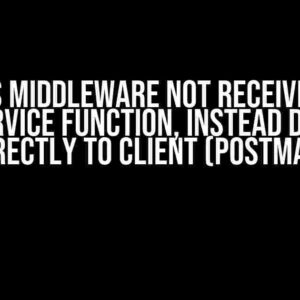Are you scratching your head, wondering why you can’t access those delicious cookies in your Node.js application? Don’t worry, friend, you’re not alone! Many developers have been where you are, and it’s a common confusion. The solution lies in using the cookie-parser middleware. In this article, we’ll dive deep into the world of cookies, req, and cookie-parser, so buckle up and get ready to learn!
What are Cookies?
Cookies are small text files stored on the client-side (usually in the user’s browser) by a web server. They contain data, such as user preferences, authentication details, and other information, that can be accessed and utilized by the server during subsequent requests. Cookies are essential for maintaining user sessions, tracking user behavior, and personalizing experiences.
Why Do I Need Cookies?
Cookies play a crucial role in various aspects of web development:
- Authentication: Cookies store user authentication information, ensuring seamless logins and maintaining user sessions.
- Personalization: Cookies help tailor the user experience based on their preferences, such as language, font size, and other settings.
- Tracking: Cookies enable websites to track user behavior, monitor analytics, and improve overall site performance.
- Session Management: Cookies manage user sessions, allowing servers to keep track of user interactions and maintain a consistent experience.
What is req?
In Node.js, req is an abbreviation for “request.” It’s an object that represents the incoming HTTP request from the client. The req object contains information about the request, such as:
- Method: The HTTP method used (e.g., GET, POST, PUT, DELETE)
- URL: The requested URL
- Headers: The request headers, including cookies
- Query: The query string parameters
- Body: The request body, containing data sent with the request
When you try to access cookies in the req object without using cookie-parser, you’ll find that the cookies are not present. This is because the req object does not automatically parse cookies.
What is Cookie-Parser?
Cookie-parser is a Node.js middleware that parses cookies from the request headers and stores them in the req.cookies object. This middleware is essential for accessing and manipulating cookies in your application.
Cookies are stored in the request headers as a single, concatenated string. Cookie-parser takes this string and breaks it down into individual cookies, making them easily accessible in your code.
How to Use Cookie-Parser
To use cookie-parser, you need to install it as a dependency in your project:
npm install cookie-parserOnce installed, you can add the middleware to your application:
const express = require('express');
const cookieParser = require('cookie-parser');
const app = express();
app.use(cookieParser());Now, when you receive an incoming request, the cookie-parser middleware will parse the cookies and store them in the req.cookies object. You can access this object to read and manipulate cookies:
app.get('/', (req, res) => {
console.log(req.cookies); // Output: { cookie1: 'value1', cookie2: 'value2' }
res.send('Hello World!');
});Troubleshooting Common Issues
I Still Can’t Get Cookies!
If you’re still struggling to access cookies, check the following:
- Have you installed and added the cookie-parser middleware to your application?
- Are you using the correct syntax to access the req.cookies object?
- Check the request headers to ensure cookies are being sent with the request.
- Verify that your browser is not blocking cookies or has cookies disabled.
Cookies are Not Being Set!
If you’re having trouble setting cookies, consider the following:
- Are you using the res.cookie() method to set cookies?
- Is the cookie-parser middleware installed and configured correctly?
- Check that your browser is not blocking cookies or has cookies disabled.
- Verify that the Set-Cookie header is being sent with the response.
Best Practices for Working with Cookies
To ensure a smooth experience when working with cookies, follow these best practices:
| Best Practice | Description |
|---|---|
| Use Secure Cookies | Use the secure flag to ensure cookies are only transmitted over HTTPS. |
| Set Cookie Expiration | Set a reasonable expiration date for cookies to ensure they’re not stored indefinitely. |
| Use HttpOnly Cookies | Use the HttpOnly flag to prevent JavaScript from accessing cookies. |
| Validate Cookie Values | Validate cookie values to prevent malicious data from being stored. |
| Avoid Overusing Cookies | Use cookies judiciously, as excessive use can lead to browser storage issues. |
Conclusion
There you have it, folks! With this comprehensive guide, you should now be able to access and manipulate cookies in your Node.js application using cookie-parser. Remember to follow best practices, troubleshoot common issues, and enjoy the sweet taste of cookie-based success!
Happy coding, and may your cookies be ever-abundant!
Here is the HTML code with 5 Questions and Answers about “I can’t get cookies in req without cookie-parser” in a creative voice and tone:
Frequently Asked Question
Are you stuck in the cookie conundrum? Don’t worry, we’ve got the sweet solutions for you!
Why do I need cookie-parser to get cookies in req?
Cookie-parser is a middleware in Express.js that parses cookies sent in the request headers and makes them available in the req.cookies object. Without it, cookies won’t be parsed and you won’t be able to access them in your request object.
Can I get cookies without using cookie-parser?
Technically, yes! But it’s not recommended. You could parse the cookie headers manually, but why reinvent the wheel? Cookie-parser is a widely-used and well-tested middleware that handles edge cases and security concerns for you.
How do I install cookie-parser?
Easy peasy! Run `npm install cookie-parser` or `yarn add cookie-parser` in your project directory. Then, add `const cookieParser = require(‘cookie-parser’);` and `app.use(cookieParser());` to your Express.js app.
Will cookie-parser affect my app’s performance?
Nah, cookie-parser is a lightweight middleware that won’t significantly impact your app’s performance. It’s a small price to pay for the convenience of easily accessing cookies in your request object!
Can I use cookie-parser with other frameworks besides Express.js?
While cookie-parser is specifically designed for Express.js, you can adapt it for use with other Node.js frameworks. However, you might need to modify the code or use a similar middleware designed for your framework of choice.





